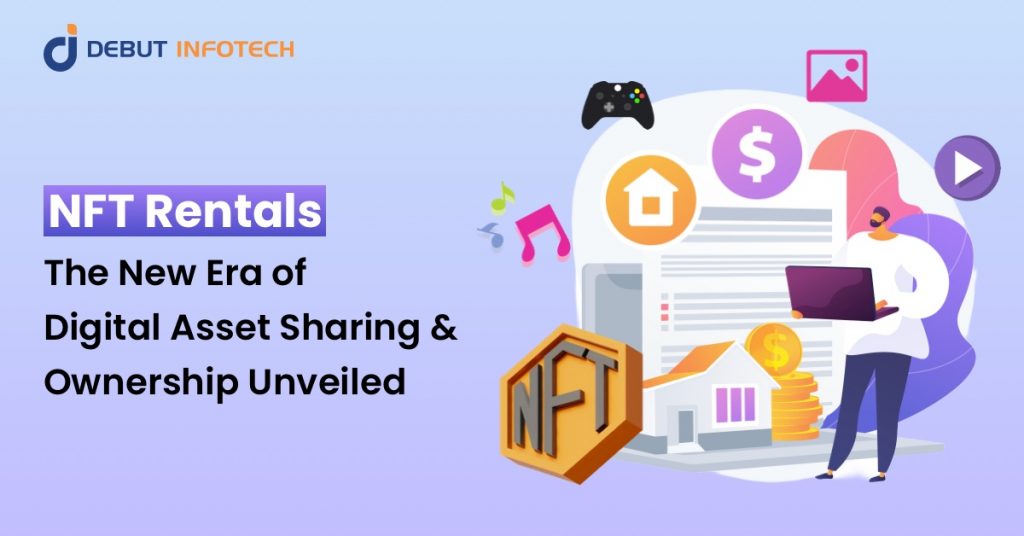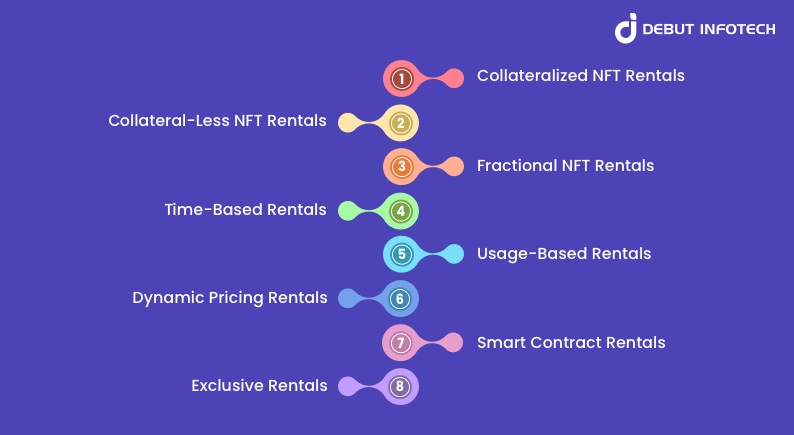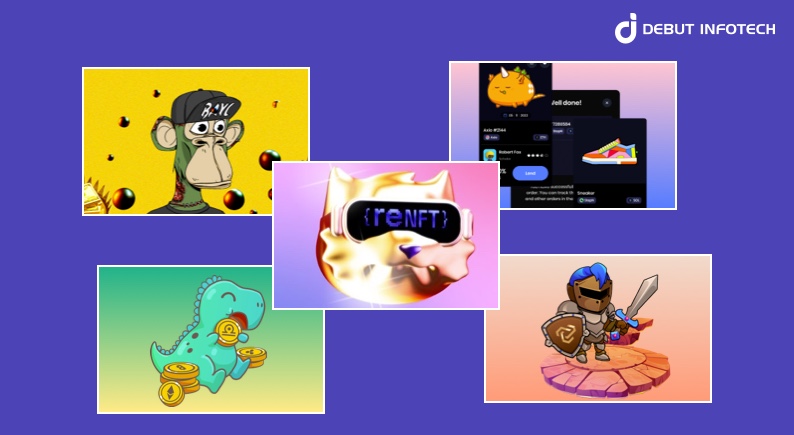
The NFT space is booming with diverse token offerings, but the high prices can be a roadblock for many. Even the cheapest NFTs from big names like Cryptopunks and Bored Apes come with a hefty price tag.
That’s why NFT renting is gaining momentum. It’s as simple as it sounds – you can rent NFTs, giving you a taste of owning a premium digital asset without breaking the bank. And to sweeten the deal, we’re bringing you recent data from renowned NFT marketplace OpenSea, renting an NFT can cost as little as $20 for a week, making it an attractive option for those looking to enter the NFT space.
Curious about how NFT rentals works and how it can be your gateway to the digital art world? Stay with us as we dive into this exciting trend, backed by data and insights that will change the way you view NFTs. Get ready for a journey that makes NFT ownership affordable and accessible.
An Overview of the NFT Rental Process
NFT renting is a groundbreaking concept in the landscape of digital assets, offering an innovative approach to accessing Non-Fungible Tokens (NFTs) without the necessity of outright ownership. This process involves an owner (lender) of an NFT agreeing to grant temporary usage rights to another party (renter) for a specified period and under predetermined terms.
Central to this arrangement are smart contracts on blockchain platforms, which autonomously execute and manage these rental agreements. Unlike traditional ownership, where the buyer gains complete control over the asset, NFT renting allows the renter to utilize or benefit from the NFT — be it for display, incorporation in digital projects, or other purposes — while the ownership remains with the lender.
This system not only makes high-value NFTs more accessible to a broader audience but also provides NFT owners with an avenue to monetize their assets without relinquishing ownership. As a result, NFT rentals are rapidly emerging as a dynamic facet of the digital economy, expanding the utility and reach of NFTs beyond traditional buying and selling.
Understanding the Process of Renting Non-Fungible Tokens (NFTs)
The process of renting Non-Fungible Tokens (NFTs) is an innovative concept in the digital asset space, enabling users to temporarily own or utilize NFTs without purchasing them outright. Here’s a breakdown of how it works:
- Ownership Retention with Enhanced Security
In NFT renting, the owner’s possession of the NFT is inviolable. Advanced blockchain technology ensures that the ownership remains with the lender throughout the rental period. This security feature is crucial in maintaining trust in the rental process.
- Detailed Rental Agreement Formation
The rental agreement is more than just duration and fees; it meticulously outlines specific conditions such as the scope of use, any royalties due from revenue generated during the rental, and penalties for breach of contract. This agreement is crafted to protect both parties’ interests and to clarify expectations.
- Robust Smart Contract Implementation
The smart contract, encoded on the blockchain, acts as an autonomous intermediary. It not only enforces the terms of the rental but also handles the logistics of the transaction, including the secure transfer of the rental fee and monitoring the rental period.
- Sophisticated Transfer of Access Rights
The transfer of rights is a nuanced process. The renter receives a temporary ‘token’ or digital certificate enabling them to use the NFT. This token is programmed to be valid only for the duration of the rental and includes security measures to prevent unauthorized duplication or misuse.
- Monitored Rental Period with Real-time Tracking
During the rental, the smart contract continuously monitors the use of the NFT. This might include real-time tracking of its usage to ensure it’s within the agreed parameters. The owner has peace of mind knowing that the NFT is being used appropriately.
- Automated Expiration and Reversion Process
At the end of the rental period, the process of reversion is automatic. The access token becomes invalid, and the renter can no longer use the NFT. The smart contract ensures a smooth transition back to the owner without the need for manual intervention.
- Dispute Resolution and Contract Compliance
In case of any disputes or breaches of contract, the smart contract can provide a record of all transactions and interactions, aiding in resolution. This level of transparency helps in maintaining the integrity of the rental process.
Exploring Different Variations in NFT Rental Models
Delve into the Evolving Landscape of NFT Rental Models: Discover hourly, daily, fractional ownership, and more. Here’s a comprehensive list of various NFT rent you can explore to maximize your NFT experience.

- Collateralized NFT Rentals
In the domain of NFT rentals, collateralization serves as a robust security measure. In this arrangement, the NFT owner, also known as the lender, requests the renter, or borrower, to provide collateral, typically in the form of another NFT or cryptocurrency.
The collateral’s purpose is to serve as a guarantee that the borrower will fulfill the terms of the rental agreement. If, for any reason, the borrower fails to meet their obligations, the lender can seize the collateral, thus safeguarding their valuable NFT asset.
However, it’s important to note that the collateral’s value must surpass that of the rented NFT, ensuring that the lender is adequately protected. Collateralized NFT rentals offer a higher degree of security for NFT owners, making them an attractive option for those seeking to share their digital assets while minimizing risks.
- Collateral-Less NFT Rentals
In contrast to collateralized rentals, collateral-less NFT rentals introduce a novel approach to the NFT sharing ecosystem. In this model, the borrower is not required to provide collateral to access the desired NFT temporarily. Instead, the transaction relies heavily on trust and reputation within the NFT community.
This approach inherently carries a degree of risk, as there is no tangible collateral to mitigate potential losses for the NFT owner. However, it can also broaden the pool of potential renters, as it eliminates the need for upfront collateral commitments. Collateral-less rentals depend on the belief that participants in the NFT space will honor their agreements and return the NFT as agreed upon.
- Fractional NFT Rentals
Fractional NFT rentals introduce a captivating concept where ownership of an NFT is divided into fractions, granting multiple users the opportunity to collectively rent and utilize the NFT. Each participant contributes a portion of the rental fee, gaining access to the NFT for a specified time or purpose.
This fractionalization democratizes access to high-value NFTs, making them more accessible to a broader audience. The appeal of fractional rentals lies in the ability to share the costs and benefits of NFT ownership, allowing enthusiasts to experience the value of owning a coveted digital asset without shouldering the entire financial burden. This model promotes inclusivity within the NFT community and opens doors to shared experiences and investments.
- Time-Based Rentals
Time-based NFT rentals revolve around the concept of granting temporary access to an NFT within a specified timeframe. Whether collateralized or collateral-less, this rental type allows users to enjoy the benefits and utility of an NFT for a predetermined duration.
Time-based rentals are well-suited for scenarios where short-term access to a digital asset is desired, such as art exhibitions, virtual events, or marketing campaigns.
By setting clear time limits for NFT rentals, both owners and renters can engage in mutually beneficial arrangements, whether it’s showcasing an NFT for a limited period or experiencing its features for a defined time. This flexibility caters to various use cases within the NFT ecosystem.
- Usage-Based Rentals
Usage-based NFT rentals bring a practical approach to the sharing economy by allowing renters to pay based on how frequently they utilize the NFT or the actual value they derive from it. This model aligns the rental fee with the NFT’s utility, ensuring fair compensation for the owner.
Blockchain technology facilitates the tracking of usage, ensuring transparent and accurate billing for renters. Whether it’s a gaming asset, software tool, or digital collectible, usage-based rentals ensure that NFT owners receive compensation proportional to the actual usage of their digital assets, promoting equitable sharing and pricing.
- Dynamic Pricing Rentals
Dynamic pricing rentals introduce a dynamic element to the NFT rental landscape. In this model, NFT owners have the flexibility to adjust rental prices based on factors such as demand, popularity, or real-time market conditions. This adaptability enables owners to maximize their earnings by capitalizing on fluctuating market dynamics.
For example, during periods of high demand for a specific NFT, an owner can increase the rental price to capture increased value. Conversely, during quieter times, prices can be adjusted downward to attract more renters. Dynamic pricing rentals offer a strategic approach to optimizing NFT income in a constantly evolving digital marketplace.
- Smart Contract Rentals
Smart contract rentals leverage blockchain technology to automate and enforce NFT rental agreements. These self-executing contracts facilitate the seamless execution of rental transactions, ensuring that terms are met and payments are made without the need for intermediaries.
Smart contracts provide transparency and security to both NFT owners and renters, as all terms and conditions are encoded on the blockchain and executed automatically. This eliminates the risk of disputes and ensures that parties can trust the integrity of the rental process. Smart contract rentals exemplify the efficiency and trustworthiness that blockchain technology brings to the NFT ecosystem.
- Exclusive Rentals
Exclusive NFT rentals offer a premium experience within the NFT rental landscape. In this model, NFT owners provide unique privileges or experiences to renters in exchange for a premium fee. These privileges can range from exclusive access to digital art galleries to participation in virtual events featuring prominent creators.
While exclusive rentals come at a higher cost, they offer a level of exclusivity and engagement that distinguishes them from other rental types. NFT owners can leverage the allure of exclusivity to attract a select audience willing to invest in premium experiences within the NFT world.
These diverse NFT rental models cater to various preferences and scenarios within the NFT ecosystem, offering flexibility and options for both asset owners and enthusiasts seeking to explore the world of digital ownership and sharing.
How NFT Marketplace Owners Can Generate Profit with the NFT Rentals Concept?
As an NFT marketplace owner, incorporating NFT rentals into your platform can open up several revenue streams and enhance the value proposition of your marketplace. Here are some ways you can earn from the NFT rentals concept:
- Transaction Fees
Implement a fee structure for each rental transaction that occurs on your marketplace. This fee could be a fixed amount or a percentage of the rental price. It’s a direct and straightforward revenue model, similar to how marketplaces charge for buying and selling NFTs.
- Membership or Subscription Fees
Offer premium memberships or subscriptions to users, providing them with additional features, discounts, or exclusive access to certain NFTs for rent. This model can create a consistent revenue stream and encourage user loyalty.
- Listing Fees
Charge NFT owners a fee to list their NFTs for rent on your marketplace. This could be a flat listing fee, a percentage of the rental price, or a tiered system based on the value or popularity of the NFT.
- Featured Listings and Promotions
Offer NFT owners the option to promote their listings for an additional fee. Featured listings could appear prominently in search results or on the marketplace’s homepage, increasing visibility and rental chances.
- Partnership and Collaboration Revenue
Collaborate with artists, brands, or other businesses to offer exclusive rental NFTs. Revenue can be generated through partnership deals, where you get a cut of the rental income or through sponsored listings.
- Commission on Renewals and Extensions
If a renter wants to extend their rental period, you can charge a commission on the extension transaction. This encourages longer rental periods and increases your revenue from each rental.
- Insurance and Protection Services
Offer additional services like insurance or protection plans for rented NFTs, ensuring their safety and integrity during the rental period. Users can pay an extra fee for these services, adding another revenue layer.
- Integration of Ancillary Services
Integrate other services such as NFT appraisals, legal advice, or technical support, and earn revenue through service fees or commissions. This approach not only generates income but also adds value to your marketplace, making it a one-stop-shop for NFT rental needs.
- Data and Analytics
Aggregate data on rental trends, popular NFTs, user behavior, etc., and monetize this information through reports, insights, or consulting services for NFT creators and investors.
- Customized Rental Agreements
Offer a service for creating customized rental agreements tailored to specific NFTs or rental conditions. This could be a value-added service for which you charge a fee.
Leading NFT Rental Marketplaces So Far
Dive into the dynamic world of NFT rentals where creativity meets convenience. Explore, engage, and expand your digital assets collection without breaking the bank. Here’s a list of various NFT rentals you can check out

- Bored Jobs
Bored Jobs is a platform specializing in collateral NFT rentals, initially centered around the Bored Ape Yacht Club collection. It has since expanded its offerings to include NFTs like Doodles and Cool Cats.
Rather than functioning as a marketplace for borrowers to seek offers, Bored Jobs acts as an intermediary for NFT owners. Those looking to rent out their NFTs connect with the Bored Jobs team, who then find suitable parties, be it brands or individuals, that meet the loan requirements.
The platform charges NFT owners a flat 15% fee after the transaction is completed, helping cover operational costs.
- reNFT
reNFT, a prominent NFT rental platform, gained significant attention when it secured $1.5 million in funding, led by Animoca Brands.
As a company deeply involved in Web 3 development, this achievement is noteworthy. reNFT operates within the collateral NFT rental space and also offers collateral-free options. It functions as a marketplace where users can browse NFT listings and select the ones of interest.
The platform relies on digital escrows based on smart contracts, and unlike many others, it does not impose any fees, aiming to promote NFT renting adoption.
- Unitbox DAO
Unitbox DAO, currently in its beta phase, focuses on introducing rewards into NFT rentals. Primarily targeting gaming communities, it aims to lower entry barriers for users. Unitbox operates on a revenue-sharing model, meaning that borrowers and NFT owners receive rewards when the borrower earns through play-to-earn activities, eliminating charges for the loan itself.
- Vera
Vera stands as a significant player in the NFT rental sector, having surpassed $2 million in transaction value by March of this year, marking a milestone for the industry.
Vera NFT rental platform is a multichain protocol that operates on a collateral-free model, utilizing Ethereum, Polygon, and BNB Smart Chain. Additionally, it offers partnership opportunities for companies seeking to establish NFT-based startups on the Vera infrastructure, leading to collaborations with DeFi apps and games looking to enter the metaverse and create their NFTs.
- Trava
Trava is an appealing peer-to-peer rental platform allowing users to create lending pools and build businesses around them. Utilizing a multichain architecture and a collateral mechanism, Trava goes beyond loans, offering staking, framing, and a marketplace for NFT buying and selling. It caters primarily to gamers, resembling a gaming platform, complete with its own NFT collection known as Trava Knight.
Let’s Get the Ball Rolling with Debut Infotech by Building Your NFT Rental Marketplace
Debut Infotech, a leading blockchain development company, has been at the forefront of delivering top-tier services for over a decade.
Specialising in NFT marketplace development, we offer the expertise and innovation needed to make your digital venture a success, providing you with a significant advantage in the global market.
Our team, comprised of seasoned professionals, harnesses the latest technologies to create solutions that are not only cutting-edge but also tailored to meet your unique needs. With a rich portfolio of successful projects, we’ve helped clients across industries to achieve their digital goals.
Ready to dominate your niche? Reach out to us today and let’s create something remarkable together.
FAQs
Q. What are NFT rentals?
A. NFT rentals refer to the temporary leasing of non-fungible tokens (NFTs), allowing users to access or utilize digital assets such as artwork, virtual real estate, or in-game items for a specified period without purchasing them outright.
Q. How does an NFT rental marketplace operate?
A. An NFT rental marketplace is a platform where users can lend out their NFTs or rent them from others. These marketplaces facilitate transactions, ensuring security and transparency through the use of blockchain technology.
Q. What is an NFT rentals protocol?
A. An NFT rental protocol is the underlying framework that enables the renting and lending of NFTs. It governs the terms of rental agreements, ensuring that both parties adhere to the specified conditions, often through the use of smart contracts.
Q. How do NFT rental smart contracts work?
A. NFT rental smart contracts are self-executing contracts with the terms of the rental agreement directly written into code. They automatically enforce, execute, and manage the rental agreement between the lender and the borrower, ensuring a trustless transaction.
Q. Can real estate be rented as an NFT?
A. Yes, virtual or digital real estate can be rented out as an NFT. NFT real estate rental allows users to gain temporary access to virtual land or properties in various metaverses or digital worlds for events, advertising, or personal use.
Q. What are the benefits of rental NFTs?
A. Rental NFTs provide flexibility and accessibility, allowing users to access various digital assets temporarily without the need for a large upfront purchase. They also enable NFT owners to monetize their assets by renting them out.
Q. Are there any risks involved in NFT rentals?
A. As with any digital transaction, risks include potential smart contract vulnerabilities or market volatility. However, reputable NFT rental marketplaces and protocols work to mitigate these risks through security measures and insurance mechanisms.
Q. How do I start renting or leasing NFTs?
A. To start renting or leasing NFTs, create an account on an NFT rental marketplace, browse available listings, and follow the platform’s process to initiate a rental agreement through their NFT rental protocol.
Q. Can I customize the rental terms for my NFT?
A. Yes, many NFT rental smart contracts allow the lender to set specific terms, such as the rental period and price, ensuring that the agreement meets their preferences and requirements.
Q. How are rental fees determined in NFT rentals?
A. Rental fees are typically determined by the NFT owner and can vary based on the asset’s value, demand, and rental period. Market dynamics and platform guidelines also influence the pricing strategies within NFT rental marketplaces.


